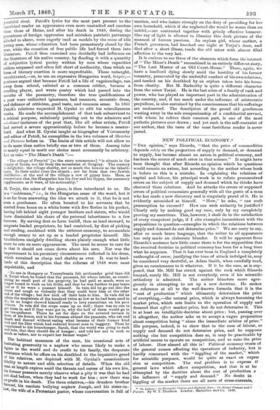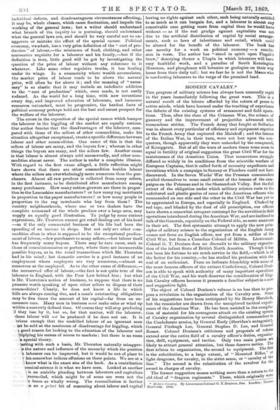NEW POLITICAL ECONOMY.* '
"THE opinion," says Ricardo, "that the price of commodities depends solely on the proportion of supply to demand, or demand to supply, has become almost an axiom in political economy, and has been the source of much error in that science." It might have been thought that after Ricardo no opinion which he questions would remain an axiom, but according to the author whose book is before us this is a mistake. In explaining the relations of capital and labour, his principal work is to refute preconceived errors on the subject of supply and demand which he thinks have obscured these relations. And he attacks the errors or supposed errors of political economists generally with all the gusto of a man who has made a new discovery and is singularly proud of it. He is evidently astonished at himself. "How," he asks, " can such presumption be excused? How can such audacity be justified? Clearly only by making good my case, only by my completely proving my assertions. This, however, 1 shall do to the satisfaction of every competent judge, if I cite examples inconsistent with the propositions in question—examples in which the relations between supply and demand do not determine price." We are sorry to say, after so much brave language, that the writer to all appearance has only made an elaborate blunder. It will be apparent from Ricardo's sentence how little cause there is for the supposition that the received doctrine in political economy has been for a long time what he supposes. That it has ever been in England a completely unthought-of error, justifying the tone of attack indulged in, may be considered very doubtful, as Adam Smith, when carefully read, gives no countenance to it whatever. If it be the case, as is supposed, that Mr. Mill has struck against the rock which Ricardo buoyed, surely Mr. Mill is not everybody, even if his scientific orthodoxy is admitted. The author blunders more egregiously in attempting to set up a new doctrine. He makes no reference at all to the well-known formula that it is the "cost of production" which ultimately determines the price of everything,—the natural price, which is always becoming the market price, which sets limits to the operation of supply and demand that affect market price, but do not determine it. This is at least an intelligible doctrine about price ; but, passing over it altogether, the author asks us to accept a vague proposition about competition being "alone the immediate arbiter of price." His purpose, indeed, is to show that in the case of labour, as supply and demand do not determine price, and he supposes nothing else but competition does so, it may be practicable by artificial means to operate on competition, and so raise the price of labour. How absurd all this is Political economy treats of the general causes affecting the operations of industry, but is hardly concerned with the " higgling of the market," which for scientific purposes, would be quite as exact an expree sion as competition. The real problem is to express ti general laws which affect competition, and that is at let attempted by the doctrine about the cost of production e the influence of "supply and demand." No doubt in haggling of the market there are all sorts of cross-currents,
individual defects, and disadvantageous circumstances affecting, it may be, whole classes, which cause fluctuation, and impede the working of the general laws ; but a writer should understand what branch of the inquiry he is pursuing, should understand what the general laws are, and should be very careful not to exaggerate or mistake the effect of the special causes. Political economy, we admit, has a very grim definition of the "cost of production" of labour,—the minimum of food, clothing, and other necessaries requisite for a labourer and his family,—but if the definition is true, little good will be got by investigating the question of the price of labour without any reference to it whatever. Like some other repulsive truths, it has healing under its wings. In a community where wealth accumulates, the market price of labour tends to be above the natural price, will often be far above it ; and the meaning of "necessary" is so elastic that it may include an indefinite addition to the "coat of production" which, once made, is not easily reduced. As the world for a long time, with new inventions every day, and improved education of labourers, and immense cesourcea untouched, must be progressive, the hardest facts of political economy perhaps hold out the best and surest prospect for the welfare of the labourer.
The errors in the exposition of the special causes which hamper the labourer in the higgling of the market are equally curious. 'Our author fancies that the disadvantages of the labourer, compared with those of the sellers of other commodities, make his situation altogether exceptional, create a specific difference between labour and other commodities. One cause of this is that the sellers of labour are many, and the buyers few ; whereas in other things the buyers are many, and the sellers few. Another cause is that labour is almost always sold unreservedly, and other commodities almost never. The author is under a complete illusion. With regard to the first cause alleged, a little reflection might have shown that there are other commodities besides labour where the sellers are overwhelmingly more numerous than the pur-chasers. Almost all raw produce is collected from many sellers, in the first instance, to be distributed after manufacture among many purchasers. How many cotton-growers are there in proportion to the Lancashire manufacturers? or how many rag merchants in proportion to the paper manufacturers? or how many people in proportion to the rag merchants who buy from them ? The -country neighbourhoods, where one or two dealers have the -complete command of the whole produce over a large area, may supply an equally good illustration. To judge by some curious expressions, Mr. Thornton cannot get retail dealing out of his head —as if the only commercial business of his life had been the -spending of an income in shops. But not only are other commodities often in what is supposed to be the exceptional predicament of labour, —few purchasers to many sellers,—but labour itself lias frequently many buyers. There may be rare cases, such as those of commissionnaires or porters, where there are innumerable possible buyers, as in the retail transactions which Mr. Thornton had in his mind ; but domestic service is a good instance of an -employment where employers are very numerous, —almost as numerous as the employed. As to the other cause of difference,— the unreserved offer of labour,—the fact is not quite true of the labourer in England, with the Poor Law behind him ; but what is Mr. Thornton's notion of business, to suppose that there is no pressure worth speaking of upon other sellers to dispose of their -commodities? Clearly, he does not know a life in which bills are always coming due, and a man's outstanding obligations may be five times the amount of his capital—far from an un-common case. Many men in business must make sales or wind up within a narrowly defined time. Of course they will stop producing 1 they lose by it, but so, for that matter, will the labourer, those labour will not be produced if he does not eat. It is erious enough that the unskilled labour of an ignorant man ast be sold at the maximum of disadvantage for higgling, which ; good reason for looking to the education of the labourer and ltiplying his means of access to markets ; but there is no room 'a special theory.
*sting with such a basis, Mr. Thornton naturally misapprels the nature and influence of the means by which the position labourer can be improved, but it would be out of place to his somewhat tedious effusions on these points. We are at a know what is the exact aim of the book. As a contribution Aomical science it is what we have seen. Looked at another ; is an amiable pleading between labourers and capitalists \reconciled, which might be of some use were not the e bases so wholly wrong. The reconciliation is farther es an a priori bit of reasoning about labour and capital having no rights against each other, each being naturally entitled to as much as it can bargain for, and a labourer in almost any conceivable case getting more from capital than he would have without — as if the real grudge against capitalists was net due to the artificial distribution of capital by social arrangements, such as laws of inheritance and entail, which could be altered for the benefit of the labourer. The book has one novelty for a work on political economy — a conclndon in verse. The author has "stood in spirit upon Pisgah's brow," descrying thence a Utopia in which labourers will have easy healthful work, and a paradise of South Kensington Museums, and ploughmen will botanize or geologize on their way home from their daily toil; but we fear he is not the Misses who is conducting labourers to the verge of the promised land.



































 Previous page
Previous page